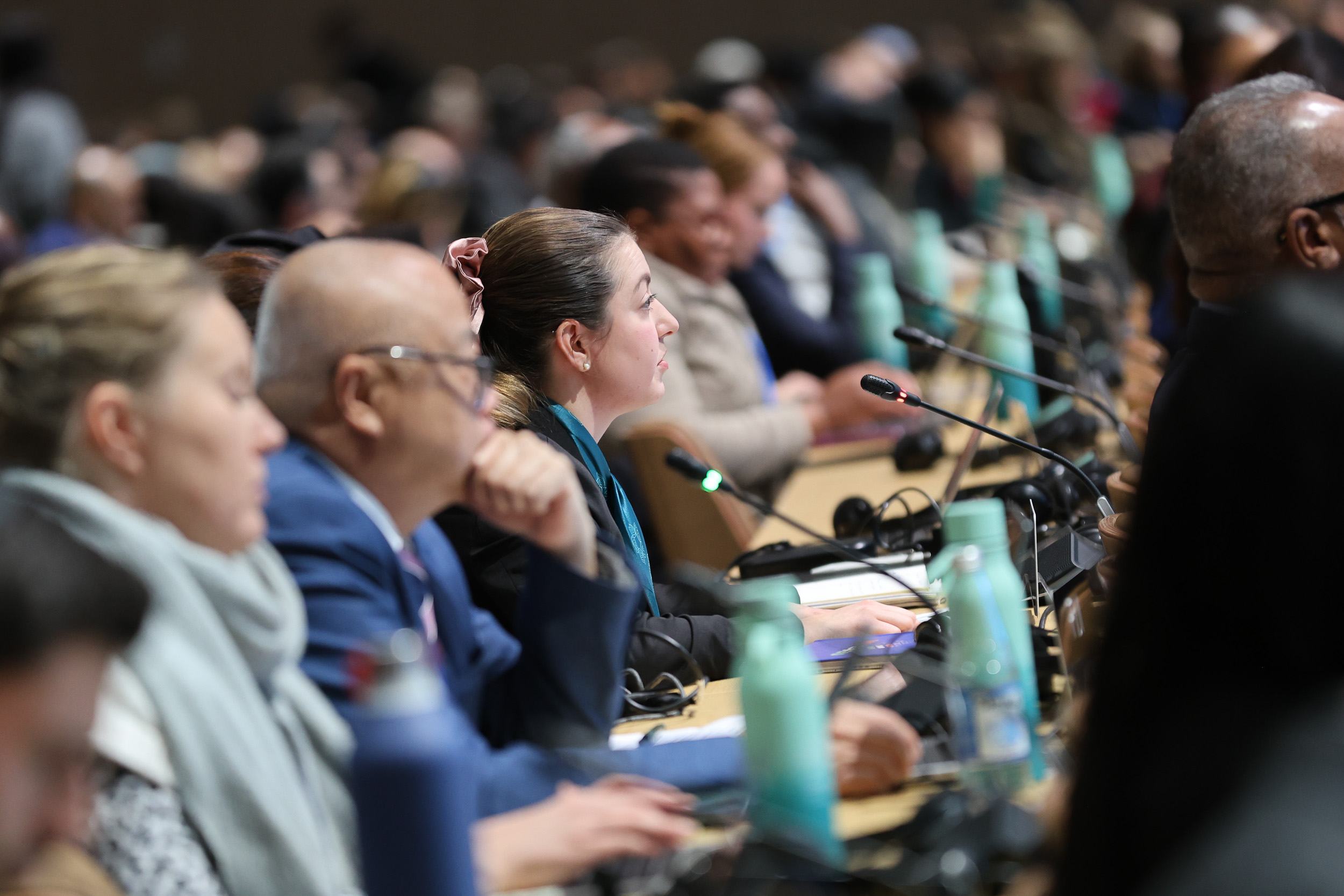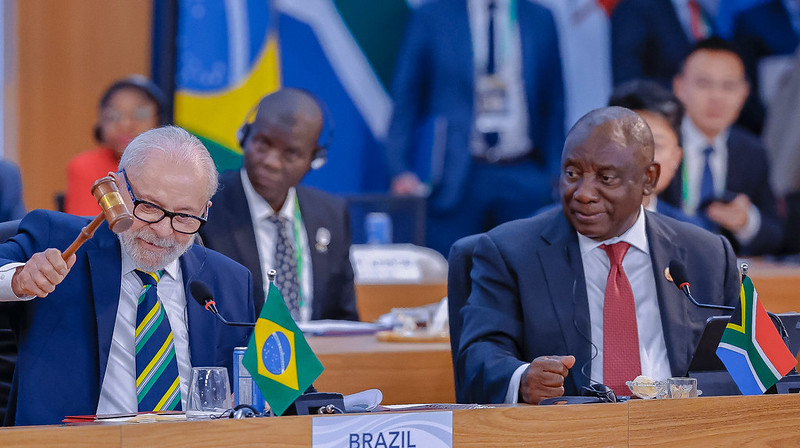This article will be updated throughout the day and an edited version will be sent out each evening as a newsletter – you can sign up here.
No concrete steer from G20 on tricky finance talks
At a press conference in Baku yesterday, COP29 President Mukhtar Babayev sent a cry for help with unlocking finance talks to the G20 leaders summit in Rio de Janeiro.
“The world is waiting to hear from them,” he said, adding “we want them to provide clear mandates to deliver at COP29 – this is their chance to show leadership.”
While Baku slept, G20 leaders in Rio put out a joint statement on tackling everything from hunger to artificial intelligence.
But the section on the COP29 finance goal was brief. “We look forward to a successful New Collective Quantified Goal (NCQG) outcome in Baku,” it said.
“We pledge our support to the COP29 Presidency and commit to successful negotiations in Baku,” it added.
UN climate chief Simon Stiell noted that G20 leaders had “sent a clear message to their negotiators at COP29: do not leave Baku without a successful new finance goal”. “This is in every country’s clear interests,” he added.
Fossil fuel transition talks rescued from brink of collapse at COP29
At the UN climate summit, some officials and campaigners alike had been hoping for more of a boost. Reuters reported yesterday that, according to two diplomats, the communiqué had planned to mention developing nations’ voluntary contributions to climate finance – one of the main sticking points in the COP29 finance talks where rich nations want to expand the donor base. But that did not make it into the final text.
Veteran climate campaigner Harjeet Singh accused G20 leaders of a “stark failure”. He said: “Their rehashed rhetoric offers no solace for the fraught COP29 negotiations, where we continue to see a deadlock on climate finance”.
“Without decisive progress on finance at COP29, we are steering towards a catastrophic temperature scenario, where the most vulnerable will bear the gravest consequences,” he added.
Still, some other analysts gave a more positive take on the G20 declaration. Andreas Sieber of climate campaign group 350.org said it could not be described as a “breakthrough” but had “got us a step closer to agreeing a finance deal here”, calling the leaders’ backing for the finance talks “significant”.
There was also hope that climate finance could eventually get a boost from the G20 leaders’ support for a tax on the super-rich, with the communique noting that “we will seek to engage cooperatively to ensure that ultra-high-net-worth individuals are effectively taxed”.
Rebecca Thissen, global advocacy lead at Climate Action Network International, said this aim “provides a clear pathway to raise the trillions of dollars required for climate action and sustainable development”.
The G20 communiqué also recognises the need for a strong replenishment of the International Development Association (IDA), a highly concessional World Bank fund to tackle poverty that observers told Climate Home could serve as inspiration for climate finance talks at COP29.
“Given that it’s a fund for development around the world and climate finance is development, we think that could be a good model,” said Luca Bergamaschi, from Italian think-tank ECCO.
IDA’s coffers are now being refilled – mostly by developed countries, among them a record $4 billion promise made on the sidelines of the G20 by the US as one of Joe Biden’s last actions as president. But some large developing countries also contribute funding to IDA, among them China, South Korea and Saudi Arabia.
EU reportedly mulling $200-300bn for NCQG
The European Union has refused to be publicly drawn on how much it thinks the post-2025 climate finance goal (known as the NCQG) should be — more than one week into COP29, its officials still haven’t publicly proposed an amount.
But Politico reports that it is internally discussing figures of between $200 billion and $300 billion a year by 2035. That’s similar to what observers at COP29 have told Climate Home that the EU is discussing.
Bergamaschi, from ECCO, said today that he thought a feasible upper limit for what could be agreed was $400 billion – if developing countries could be persuaded to agree to expand the list of contributors in some way beyond developed nations.
A recent UN-commissioned report by economists Vera Songwe, Nicholas Stern and Amar Bhattacharya found the figure should be at least $300 billion.
These numbers cover finance provided by governments, private finance mobilised by government investment and a proportion of multilateral development banks’ funding. This so-called “core goal” would replace an existing goal of $100 billion a year from 2020.
This is likely to be part of a larger, broader NCQG that will also include private finance and other sources of finance, and is likely to be at least $1 trillion a year.

EU negotiator Veronika Skolasztika Bagi (Photo by IISD/ENB | Mike Muzurakis)
Fossil fuel transition left out at G20
On global efforts to cut emissions and boost clean energy, the G20 leaders said they “fully subscribe to the ambitious and balanced outcome” from COP28 in Dubai last year, without explicitly mentioning the pledge made there to “transition away from fossil fuels” in energy systems.
Ani Dasgupta, head of the World Resources Institute, said it was “unfortunate that the G20 failed to reiterate the commitment to shift away from fossil fuels” – which was widely viewed as a historic outcome from the COP28 summit.
Saudi Arabia was one of the main blockers for the fossil fuel language at G20, the New York Times reported. The oil-rich kingdom has also blocked fossil fuel transition language at COP29, where observers told Climate Home Saudi negotiators were “happy to be destructive”.
The G20 communiqué does mention the COP28 pledge to triple renewable energy and double energy efficiency. The text also expresses support for “low-emission technologies”, which was interpreted as meaning fossil gas in the outcome from COP28.
The G20 declaration appears to even give room for the expansion of other fossil fuels, as it expresses support for “abatement and removal technologies in line with national circumstances by 2030” – which are ways to stop emissions from burning oil, gas and coal from being released into the atmosphere.
India, Indonesia and China have large expansions of coal-fired power in the pipeline, while the US is behind a third of the world’s planned expansion of oil and gas.
Champa Patel, executive director for governments and policy at the Climate Group, said that to avoid backsliding, the G20 needed to be bolder.
“With an incoming President Trump, this task will get harder. It’s outrageous that in 2024, which is already the hottest year on record, the biggest economies in the world can’t state the truth: that we need to phase out fossil fuels now,” she said.
